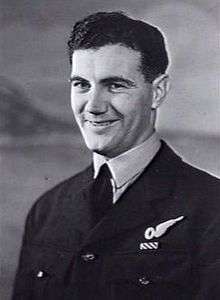Ray Watts
| Ray Watts | |||
|---|---|---|---|
 | |||
| Personal information | |||
| Full name | Raymond Carson Watts | ||
| Date of birth | 13 August 1917 | ||
| Place of birth | Launceston | ||
| Date of death | 17 January 2008 (aged 90) | ||
| Original team(s) | Churinga | ||
| Height / weight | 188 cm / 86 kg | ||
| Position(s) | Key forward | ||
| Playing career1 | |||
| Years | Club | Games (Goals) | |
| 1937–1941 | Essendon | 59 (149) | |
|
1 Playing statistics correct to the end of 1941. | |||
Raymond Carson Watts DFC (13 August 1917 – 17 January 2008) was an Australian rules footballer who played with Essendon in the Victorian Football League (VFL).
A forward, Watts grew up in Launceston and played his early football with Churinga in the Tasmanian Amateur Football League.[1] He won the league's awarded for the best and fairest player in 1935.
Watts made his VFL debut in the 11th round of the 1937 VFL season against North Melbourne and kicked three goals.[2] He kicked 60 goals for Essendon in 1938, a total bettered by only one teammate, Tom Reynolds.[2] This included a career best seven goals in a win over St Kilda, which he equaled twice more in his career.[2] He was Essendon's third leading goal-kicker in 1939 and 1940.[2]
He was a member of the Essendon seconds premiership team in 1941 but made only two appearances in the seniors that year, as he had enlisted with the Royal Australian Air Force.[2][3]
During the war he served as a warrant officer and in 1943 was awarded a Distinguished Flying Cross, along with his pilot Arthur Simpson, for their efforts in a bombing operation over Germany. They were flying over Hanover on a Lancaster bomber when the airscrew of a German night fighter tore a hole under the plane's nose, which resulted in the plane falling 3000 feet. Despite this, they were able to recover and still achieve their objectives in dropping the bombs at their target.[4]
In 1944 he was shot down by enemy fire and managed to hide in a Belgian pine forest for six weeks until he was captured. He spent more than a year in a German prisoner of war camp.[5]
He returned to Essendon in 1945 and played briefly in the seconds before transferring to Preston.
References
- ↑ Holmesby, Russell; Main, Jim (2007). The Encyclopedia Of AFL Footballers. BAS Publishing. ISBN 978-1-920910-78-5.
- 1 2 3 4 5 AFL Tables: Ray Watts
- ↑ "WW2 Nominal Roll". Government of Australia.
- ↑ The Mercury,"Two Australian Airmen Awarded DFC", 4 November 1943, p. 2
- ↑ "Watts, Ray". Essendon Football Club official website.